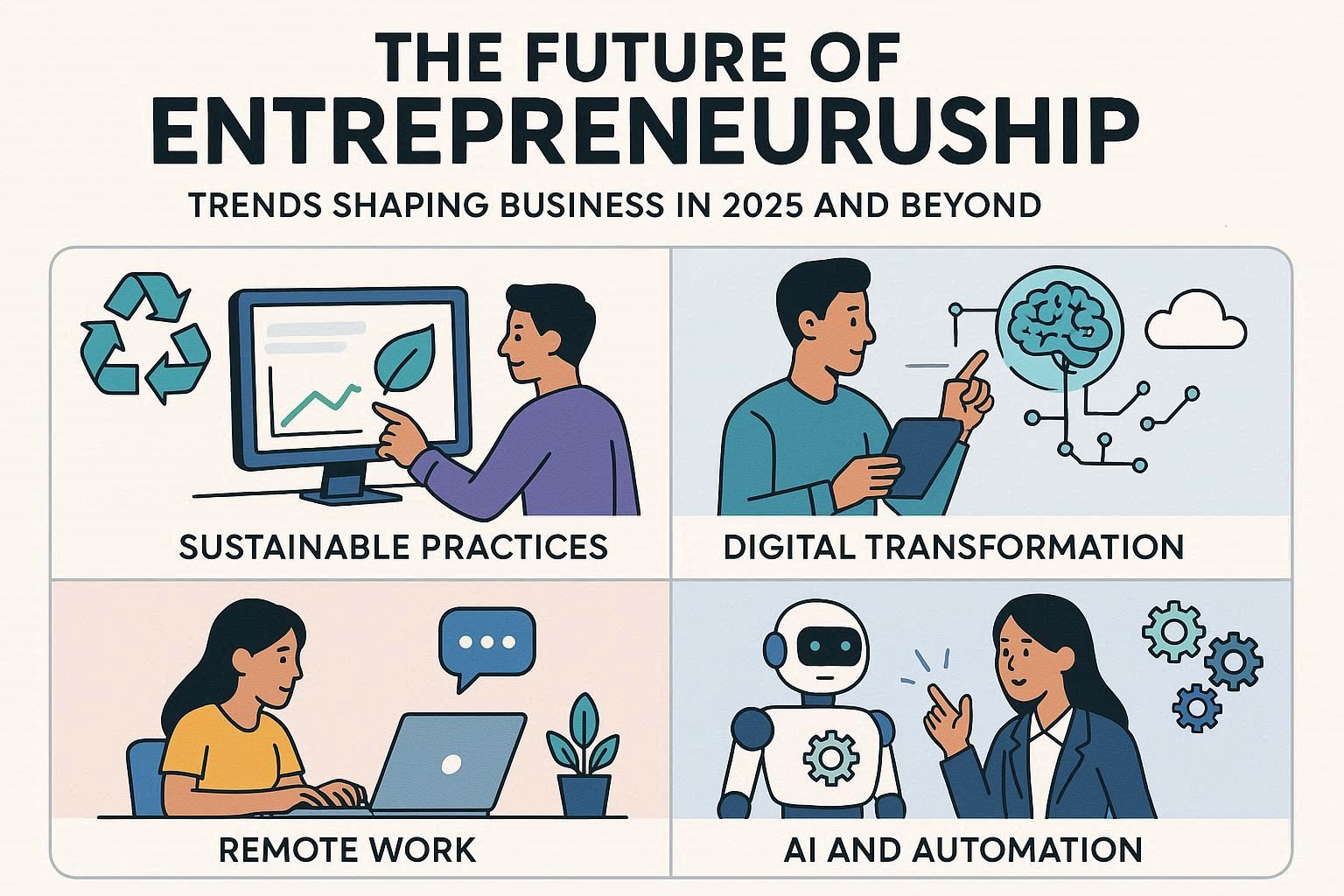Entrepreneurship has always been at the heart of economic growth. From small shops to global tech giants, entrepreneurs fuel innovation, create jobs, and solve pressing problems. However, the business landscape is changing faster than ever. Technology, consumer expectations, and global challenges are reshaping how entrepreneurs build and scale companies.
This article explores the major trends shaping entrepreneurship in 2025 and beyond, highlighting the opportunities and challenges entrepreneurs must navigate to succeed in the years ahead.
1. The Shift Toward Digital-First Businesses
The modern entrepreneur cannot ignore the digital economy. Online platforms, mobile apps, and cloud-based services are now central to business models across industries. E-commerce, for example, continues to grow at an unprecedented pace, with small businesses leveraging marketplaces like Shopify, Amazon, and Etsy to reach global customers.
Beyond retail, digital-first strategies are transforming industries such as healthcare, finance, and education. Telemedicine platforms, mobile banking apps, and e-learning startups demonstrate how technology is redefining customer experiences. Entrepreneurs who embrace digital-first thinking position themselves for long-term success.
2. The Role of Artificial Intelligence in Entrepreneurship
Artificial intelligence (AI) is no longer limited to large corporations. Affordable AI-powered tools now help small businesses and startups analyze data, predict consumer behavior, and automate repetitive tasks. For entrepreneurs, AI means faster decision-making, smarter marketing campaigns, and personalized customer experiences.
AI also opens the door to entirely new business models. Startups focused on AI-driven health diagnostics, predictive analytics, or automation tools are gaining traction. However, entrepreneurs must also be aware of ethical considerations, including data privacy and bias, when integrating AI into their operations.
3. Sustainability as a Core Business Value
Consumers and investors increasingly demand that businesses operate responsibly. Entrepreneurs who prioritize sustainability are not only contributing to a healthier planet but also gaining a competitive advantage. Green startups focused on renewable energy, eco-friendly products, and circular economy solutions are attracting funding and loyal customer bases.
Sustainability is no longer a niche trend; it has become a mainstream expectation. From packaging to supply chains, entrepreneurs who integrate eco-friendly practices into their business models will be better positioned to meet future market demands.
4. The Rise of the Remote-First Entrepreneur
Remote work has unlocked opportunities for entrepreneurs worldwide. Digital collaboration tools allow founders to build distributed teams, access global talent, and reduce overhead costs. Many new ventures are starting without physical offices, relying entirely on virtual environments.
This shift has also given rise to “digital nomad entrepreneurs” who run successful businesses while traveling the world. While remote-first models offer flexibility, they also require strong communication, cybersecurity, and cultural alignment to maintain productivity and company culture.
5. Funding and Investment in the New Era
The way entrepreneurs raise capital is evolving. While venture capital remains important, alternative funding sources are gaining popularity. Crowdfunding platforms, angel investors, and revenue-based financing provide startups with more flexible funding options.
Moreover, investors are increasingly interested in startups that combine profitability with social impact. Businesses addressing climate change, healthcare access, or financial inclusion are more likely to secure investment in the coming years.
6. Challenges Facing Entrepreneurs
Entrepreneurship remains rewarding but is never without hurdles. Some of the key challenges include:
6.1 Market Saturation – Many industries are crowded, making it difficult for new businesses to stand out.
6.2 Economic Uncertainty – Inflation, global conflicts, and financial instability create risks for startups.
6.3 Talent Acquisition – While remote work opens global hiring opportunities, competition for top talent is fierce.
6.4 Technological Change – Rapid innovation means entrepreneurs must constantly adapt to remain relevant.
Navigating these challenges requires resilience, adaptability, and a clear long-term vision.
7. Strategies for Entrepreneurial Success in 2025 and Beyond
To thrive in the evolving business landscape, entrepreneurs should adopt the following strategies:
7.1 Leverage Technology – Adopt AI, cloud platforms, and automation to improve efficiency and scalability.
7.2 Build Strong Brands – Focus on authenticity, transparency, and storytelling to connect with customers.
7.3 Stay Agile – Be prepared to pivot business models quickly in response to market changes.
7.4 Prioritize People – Invest in employees, partners, and communities to build sustainable relationships.
7.5 Think Globally – Use digital platforms to reach international audiences and tap into new markets.
8. The Global Outlook for Entrepreneurship
Entrepreneurship is becoming more democratized. With access to digital tools, affordable marketing channels, and remote work capabilities, more people around the world are able to start businesses than ever before. This democratization means increased competition but also greater innovation.
Emerging markets, in particular, are becoming hotbeds of entrepreneurial activity. Africa, Southeast Asia, and Latin America are producing startups that address local challenges with global potential. Entrepreneurs who recognize and adapt to these opportunities will play a vital role in shaping the global economy.
Conclusion
Entrepreneurship in 2025 and beyond will be defined by digital innovation, sustainability, remote-first models, and evolving investment strategies. The challenges are significant, but so are the opportunities.
Entrepreneurs who embrace technology, prioritize responsibility, and stay agile will not only survive but thrive in the new business landscape. The future of entrepreneurship is global, digital, and socially conscious, and those who adapt quickly will lead the next wave of economic transformation.

